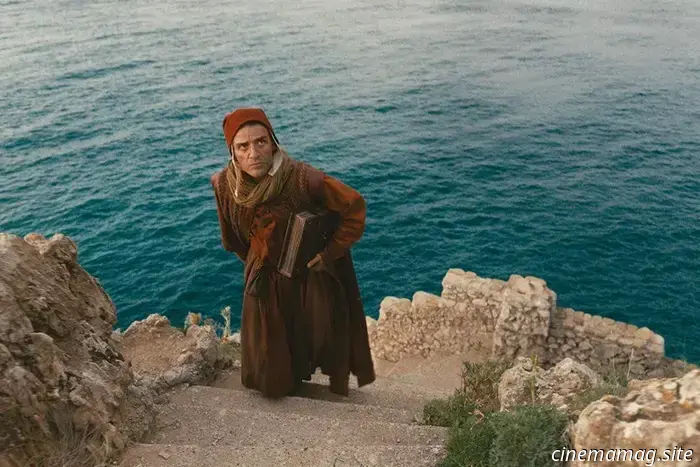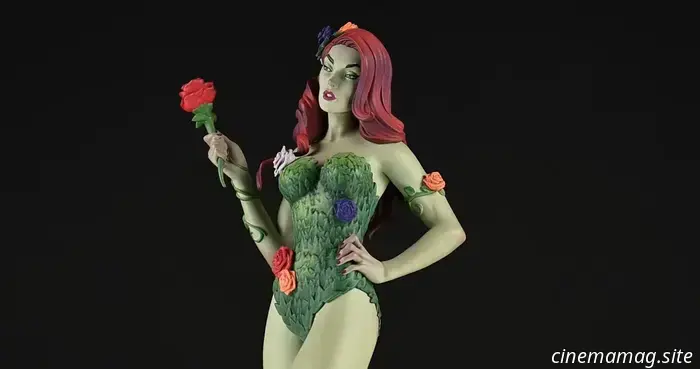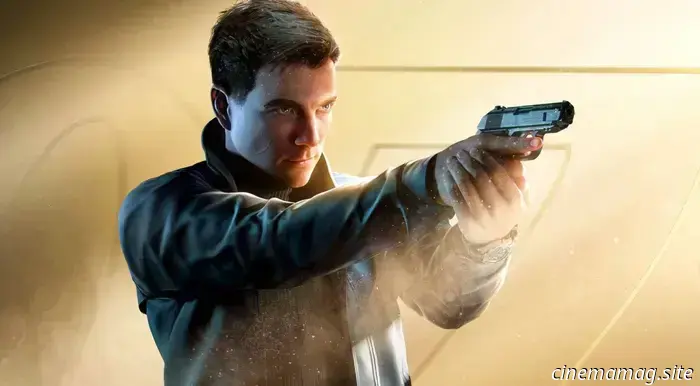
Venice Review: Julian Schnabel's In the Hand of Dante Creates a Chaotic, Fragile Journey for Oscar Isaac and Martin Scorsese.
"There’s no reason a child from a family of gangsters couldn't be the reincarnation of Dante Alighieri," states Julian Schnabel in his director's remarks regarding his upcoming film, In the Hand of Dante. This bold confidence reflects the film's final outcome, an Out of Competition entry where anything seems feasible. If the Renaissance genius Dante Alighieri can abandon his Beatrice for another woman, then it's not far-fetched for Gerard Butler to portray a Renaissance Pope and Gal Gadot to take on the role of Botticelli’s Venus, despite appearing somewhat lifeless amid a hectic production largely funded by Cartier. Narrative-wise, In the Hand of Dante intertwines two timelines with unique visual styles—the 1300s presented in color and the early 2000s in black-and-white—while showing little concern for the commonalities between these worlds (apart from actors playing different roles in each).
At the heart of the film is Nick (Oscar Isaac), representing writer, journalist, and biographer Nick Tosches, whose namesake novel drives the chaotic narrative of overlapping timelines. Surrounding him are his new secretary Guiletta (Gal Gadot), the crude yet highly efficient hitman Louis (Gerard Butler), and the dubious Joe Black (John Malkovich), whose informants have gained access to the original manuscript of Dante's The Divine Comedy, which had previously been considered lost. Although Nick's knowledge of Renaissance literature seems more like a hobby and a means of self-promotion, it suffices for Joe Black to rely on him for the manuscript's authentication. He appears trustworthy (even if you've already witnessed him confessing to a murder at the age of ten).
The film opens with a title card providing context about Dante Alighieri and Tosches, yet it fails to establish any connection for viewers unfamiliar with the book. While it's acceptable to require the audience to catch up, Schnabel and co-writer Louise Kugelberg, at least in the first act, are somewhat overly demanding. Presenting the intricate time-jumps in a more logically coherent manner would demonstrate genuine consideration for newcomers; in this aspect (and a few others), In the Hand of Dante goes full Megalopolis with its literary allusions, erudite insights, and gaudy aesthetic choices, overwhelming you with its eccentricity before you can utter “Alighieri.”
Much of the theatricality in dialogue, gestures, and costumes is reserved for the 14th century, allowing for moments to appreciate Martin Scorsese’s elfin beard and attitude as he guides the struggling Dante (Isaac) through writer’s block. Their conversations, similar to Nick’s modern-day monologues about penmanship, might come across as excessively pretentious and off-putting had they not been delivered by such talented actors; it becomes surprisingly easy to be entranced by Oscar Isaac’s rhythm as he recites Dante in the original Italian, capturing every nuance of the verse and its melodic unity. A significant portion of that charm is missing in the “present-day” timeline, where Isaac’s features reflect Nick’s obstinacy. The actor makes a commendable effort to broaden the emotional range of his character—at times, Nick Tosches resembles the polished William Tell from The Card Counter. Schnabel’s film, in contrast to Paul Schrader’s, treats the crime-thriller genre with ridicule until the very end, but it does so in such a wildly erratic way that one cannot help but applaud the final scene, which, whether by coincidence or design, unfolds in Venice.
In the same way that dreams can reveal truths, In the Hand of Dante is most effective just before you awaken from it—its beauty at times appears tumultuous within its landscapes, skies, and Oscar Isaac’s visage, expertly captured (by DoP Roman Vasyanov) from a slightly elevated perspective. Fully aware of its position between Inferno and Paradise, In the Hand of Dante wears its revisionist qualities like a beauty-pageant sash in the absence of a crown.
In the Hand of Dante debuted at the 2025 Venice Film Festival.
Other articles
 Underrated Clint Eastwood Films: Tightrope
Here are 12 of Clint Eastwood's most overlooked films.
Underrated Clint Eastwood Films: Tightrope
Here are 12 of Clint Eastwood's most overlooked films.
 Poison Ivy becomes a part of the DC Cover Girls collection with the latest collectible statue from McFarlane Toys' DC Direct line.
McFarlane Toys has officially revealed the newest entry in its DC Direct DC Cover Girls collection, featuring a 1:8 scale Poison Ivy statue inspired by the artwork of J. Scott Campbell. This DC collectible is now available for pre-order at a price of $199.99; check out the official promotional images and details […]
Poison Ivy becomes a part of the DC Cover Girls collection with the latest collectible statue from McFarlane Toys' DC Direct line.
McFarlane Toys has officially revealed the newest entry in its DC Direct DC Cover Girls collection, featuring a 1:8 scale Poison Ivy statue inspired by the artwork of J. Scott Campbell. This DC collectible is now available for pre-order at a price of $199.99; check out the official promotional images and details […]
 Experience the world of James Bond in the gameplay reveal video for 007 First Light.
In a special Sony PlayStation State of Play event, IO Interactive and Amazon MGM Studios debuted the initial gameplay footage for the anticipated 007 First Light. They also announced that this reimagined origin tale of James Bond is set to be released on Xbox Series X|S, PlayStation 5, Nintendo Switch 2, and PC on March 27th. During the extensive […]
Experience the world of James Bond in the gameplay reveal video for 007 First Light.
In a special Sony PlayStation State of Play event, IO Interactive and Amazon MGM Studios debuted the initial gameplay footage for the anticipated 007 First Light. They also announced that this reimagined origin tale of James Bond is set to be released on Xbox Series X|S, PlayStation 5, Nintendo Switch 2, and PC on March 27th. During the extensive […]
 12 Timeless Films That Remain Enjoyable to Watch
12 Timeless Films That Remain Enjoyable to Watch
 Realm of Satan Review: A Vivid Invitation into a Realm of Imagination
Note: This review was initially published as part of our 2024 Sundance coverage. Realm of Satan is now available digitally. Created in partnership with the Church of Satan, as noted in its opening credits, Scott Cumming’s Realm of Satan does not aim to unveil the hidden truths of the religion or examine the church’s position among other belief systems.
Realm of Satan Review: A Vivid Invitation into a Realm of Imagination
Note: This review was initially published as part of our 2024 Sundance coverage. Realm of Satan is now available digitally. Created in partnership with the Church of Satan, as noted in its opening credits, Scott Cumming’s Realm of Satan does not aim to unveil the hidden truths of the religion or examine the church’s position among other belief systems.
Venice Review: Julian Schnabel's In the Hand of Dante Creates a Chaotic, Fragile Journey for Oscar Isaac and Martin Scorsese.
“In the Hand of Dante,” Julian Schnabel’s director’s statement asserts, “There’s no reason that a child from a gangster family couldn’t be the reincarnation of Dante Alighieri.” This confident assertion reflects in the outcome, presenting an Out of Competition entry where anything can happen. If the brilliant mind of the Renaissance, Dante
